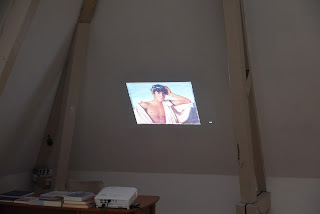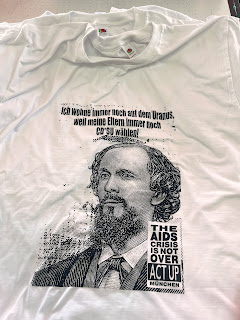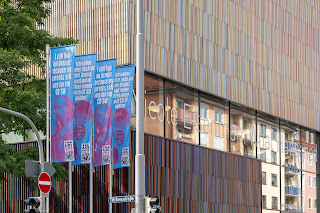LOVE PLANETS
Philipp Gufler and Cosy Pièro
23 June - 28 July 2023
Opening 22 June 2023, 6 - 8 pm
with a book presentation of A Shrine To Aphrodite by Philipp Gufler (Hammann Von Mier Verlag, 2023)
What planet do we live/love on? Is love timeless, infinite even? Who loves who or what? Philipp Gufler and Cosy Pièro’s work in the exhibition, Love Planets, at the Galerie Françoise Heitsch revolve around such questions of love in the broader sense of the word.
In Philipp Gufler’s Die Wirrwelt der Urninge (2023), brightly coloured undressed bodies unite in dance and desire against an idyllic mountain backdrop. Those potrayed in this paradise – the Uranians – owe their name to the planet Uranus and a mythological reference: the ancient Greek god Uranus, who has symbolized same-sex love since antiquity.¹ Without a woman’s involvement,, the goddess of love Aphrodite emerged from sea foam made up of Uranus’ fallen body parts. Based on this, Karl Heinrich Ulrichs (1825-1895) coined the term Uranian, even before words such as gay or homosexual dominated language (initially and predominantly with negative connotations). Uranian was completely different, as Ulrichs also described himself as a pioneer of the queer emancipation movement in 1867 in what was most likely the first outing in modern history. Gufler takes a similar, proud stance when he confidently lends his own face to some of the figures in the picture. In terms of form and motif, the screen prints on paper refer to the wall-filling panorama Die Klarwelt der Seligen, which Elisàr von Kupffer (1872−1960) painted in 1925/37 within the context of the religious movement Klarismus. For Philipp Gufler, the mural stands for a paradisical, non-binary imagination of love set apart from categories of difference.²
By referencing the works of certain people of past generations, Gufler pays homage to a Queer Futurity³, which, in addition to Ulrichs and von Kupffer, is also primarily aimed at the second artist in this exhibition: Cosy Pièro. However, her artistic works reflect less on utopian future scenarios, as they are literally
anchored in life: for example, the leather shoes on which she wrote GEHEN LASSEN (letting go) with adhesive letters (2014). In sculptural gestures and with reduced text, such as Potenzial, Pièro negotiates fundamental parameters of human existence: energy, death, love. Everything and everyone have potential, yet contradictions remain. They are abstract, poetic comments on the inadequacies of the present; the political rationalisation of being together, the insistence on gender binaries, the heteronormative understanding of love. Aptly drawn on a deep blue screenprint: Ich liebe nur die Illusion (2012).
The visual artist’s commitment to this present is anything but illusory. With the bar “Bei Cosy”, she created one of the few spaces for the queer community in Munich from 1962 to 1980. In this space as well as in her art the focus was on encounters between people, regardless of age, origin, gender, and sexuality; an attitude that is particularly impressive in times of identitarian demarcations. Attracted by this, Philipp Gufler realised a re-enactment of the “Bei Cosy” bar in Amsterdam and Munich in 2015 and 2017 respectively, with the Publik Universal Frxnd. Cosy and Gufler have elective affinities for each other and have met over the search for queer points of reference in the past and present. They have been friends for nearly 10 years, have collaborated several times in the past and are now exhibiting here for the first time in a duo exhibition.
The heterogeneous oeuvres of Cosy Pièro and Philipp Gufler come together in this intersectional queering. Just as Pièro's works are reflected in Gufler's screen-printed mirrors in the exhibition, her work reflects back to Gufler, an artist several generations younger. On the occasion of the publication Cosy bei Cosy (2023), published in collaboration with Ruine Munich,⁴ he dedicated a performance including a costume to her, which can be seen in the exhibition. Photographs of Pièro's Potenzial series are printed on the robe. The future moment of the exhibition manifests itself in this closeness across spatial and temporal distances: Queer Futurity overcomes the utopian mode. It is not a longing for a queer, intangible future reality, but a creation in the form of a transgenerational solidarity and reflection between two artists, through live/love.
Mareike Schwarz
¹ https://schwulengeschichte.ch/epochen/2-weg-zur-selbstbestimmung/vorkaem....
² Philipp Gufler, Zine for the exhibition Substitutes at W139 in Amsterdam, 2023, page 8.
³ José Esteban Muñoz, Cruising Utopia: The Then and There of Queer Futurity, NYU Press, 2009.
⁴ Thanks go to the members of Ruine München: Leo Heinik, Jan Erbelding and Maria VMier.
Galerie Françoise Heitsch
Amalienstrasse 19
80333 München
Germany























































